Food From Many Greek Kitchens
Food, culture, celebration, and memory are inexorably tied together inside Tessa Kiros’s Food from Many Greek Kitchens. As the follow-up to her best-selling Venezia and Falling Cloudberries, Food from Many Greek Kitchens explores Kiros’s Greek-Cypriot heritage and takes readers on a colorful journey into the Greek kitchens of her friends and family as she catalogs the traditional foods for fasting, festivals, and feast days.
Food, culture, celebration, and memory are inexorably tied together inside Tessa Kiros’s Food from Many Greek Kitchens. As the follow-up to her best-selling Venezia and Falling Cloudberries, Food from Many Greek Kitchens explores Kiros’s Greek-Cypriot heritage and takes readers on a colorful journey into the Greek kitchens of her friends and family as she catalogs the traditional foods for fasting, festivals, and feast days.
Recipes like Vassilopitta New Year Wish Cake, Lamb in a Flowerpot with Dill and Red Wine, Yamopilafo Wedding Rice, and Easter Soup are accompanied by short introductions that explain each dish’s cultural significance. In addition, lavish full-color photographs take readers on a tour from the local Mediterranean fishmongers and markets into Greek family homes and kitchens to experience the best in authentic Greek cooking.
With a glossary and more than 200 classically prepared Greek recipes, Food from Many Greek Kitchens adds a greater depth of flavor to each dish.
Tessa Kiros was born in London to a Finnish mother and a Greek-Cypriot father. The family moved to South Africa when she was 4, and at the age of 18, Tessa set off to travel and learn all she could about the world’s cultures and traditions and new ways of living and eating. She has cooked at London’s Groucho Club and in Australia, Greece, and Mexico. On a trip to Italy to study language and food, she met her husband, Giovanni, and now lives in Tuscany.
“In addition to its recipes, “Food From Many Greek Kitchens” provides an intimate sensory look into the rich history of the country and its deep-rooted traditions, both culinary and otherwise. … This is a fun cookbook and the next best thing to actually visiting Greece and sampling its food. Most of the recipes can be made without trips to a gourmet shop for difficult-to-find ingredients.”
––Tuscon Citizen
“[Food From Many Greek Kitchens is], the sort of solid, well-researched book that just happens to have stunning photos, not one dependent on them for attention. Because it is really Kiros’ authentic recipes, like hortopita (a savory pie filled with wild greens, fennel and dill), kokkoras krassatos (”wined rooster” — rooster simmered in red wine, tomatoes and spices and served over hilopites, homemade egg noodles) and pastelli (sesame and pistachio honey candies), that keep us turning the pages.”
––LA Weekly
“British cookbook author Tessa Kiros’s culinary fluency knows no bounds. In prior works, she has mastered the fares of Finland (her mother’s home), Italy (where she currently resides) and now, Greece (her father is from Cyprus). Like her other published epicurean voyages, “Food From Many Greek Kitchens” is both a visual feast and an instant travel companion to home cooks. While recent authors have tackled Greek cuisine with a focus on modern-fusion takes, Ms. Kiros refreshingly sticks to the classic dishes served on family tables for holiday fêtes, religious observances and everyday meals. Chapters range from those devoted to vegetable preparations and heartier dishes (that require extra time in the oven) to indigenous baked goods, such as pita. We especially love the mezedes, a selection of appetizers like tomato fritters, grilled octopus and saganaki (fried cheese) with honey and sesame.”
––The Wall Street Journal
“This is a cookbook that is also a journey into Greek culture with many beautiful photographs along with the author’s personal anecdotes about the food and celebrations of the region. Authentic Greek recipes are included for appetizers, soups, main dishes, breads, salads, and desserts.”
––Books and Chocolate
“Tessa Kiros‘ books are stunning. Falling Cloudberries and Venezia are rich with photographs of street life, food, culture, and good recipes. Food from Many Greek Kitchens is no exception.”
––Super Chef
“Tessa Kiros is many things, all of which add up to magic: she is a cook who wants to share her recipes; she is a writer whose words sing about the poetry of the kitchen; she is a lover of fresh ingredients that don’t need disguises. All of her work is honest and direct, aimed at the pleasure to be found in food. Kiros does not merely write recipes – she opens her arms to embrace the culture and ethos of the people. Born of a Greek-Cypriot father, her work reflects a profound understanding of Greek cuisine and culture. Her sensibility is attuned to people, and she writes with the pen of a poet. Working with photographer, Manos Chatzikonstantis, she creates a marriage of words and photographs so special that the reader is transported to Greece. Of course these recipes will succeed – we become Greek as we read Kiros’ work.”
––In Mamas Kitchen
“For an introduction to her book, “Food From Many Greek Kitchens,” author and world-traveler Tessa Kiros serves up simply the Greek alphabet — paired with an explanation of food beginning with each letter. And she follows it up with a glossary of Greek cooking terms. When you’re making 115 authentic Greek recipes, each including an explanation of the dish’s cultural significance, you’ll want to digest as much of an understanding of what it’s like to be a Greek cook as possible. “Some of the recipes are Kiros’ creations, others come from friends and family members, but all show appreciation for Greek cooking and life.””
––CantonRep.com
“With a Greek-Cypriot father, a Finnish mother and a Russian great-great grandmother, London-born Tessa Kiros was born into a family with diverse culinary backgrounds. When Kiros was four years old, she moved with her family to South Africa and when she was 18, began traveling to learn about the cuisines and cultures of other places such as Australia, Greece and Mexico. Kiros’ experiences come to life through her cookbooks’ recipes and through the numerous reminiscences about the people and places she cares for. ”
––Bluffton Today
Pantzarosalata
(Beets with Yogurt + Pistachios)
Psari Vrasto Ladolemono
(Poached Fish with Lemon Oil)
Pantzarosalata
(Beets with Yogurt + Pistachios)
This is the way my friend Annette makes her beet salad. I love the colors here. And its freshness, even though it looks mayonnaisy; it’s a surprise to remember that it’s actually much lighter than it looks.
This is wonderful with fresh, roasted beets, or you can also use canned beets, in which case it will only take a second to put together. If you are using fresh ones and they have leaves, you can boil those too for a few minutes and dress them with olive oil to serve.
If using fresh, cut the leaves well above the bulb so that they don’t bleed.
1 POUND 7 OUNCES BEETS (ABOUT 4), LEAVES TRIMMED, OR
1 POUND 2 OUNCES CANNED BEETS
3 TABLESPOONS OLIVE OIL
JUICE OF ½ LEMON
2 GARLIC CLOVES, FINELY CHOPPED
3 TABLESPOONS COARSELY CHOPPED ITALIAN PARSLEY
SALT AND FRESHLY GROUND BLACK PEPPER
1 1/3 CUPS GREEK YOGURT
1 TABLESPOON SHELLED PISTACHIO NUTS, CHOPPED
Preheat the oven to 350°F. Wash the (fresh) beets well, being careful not to pierce their skins. Wrap each fresh beet individually in aluminum foil and bake for about 1 hour, until tender when tested with a sharp knife.
Whip the oil lightly in a bowl with the lemon juice and garlic.
Wearing kitchen gloves, peel the beets. Trim away the root and cut them into nice chunks. If you are using canned beets, rinse if necessary and trim away any tough end bits and cut into chunks. Put in a bowl. Add the lemon oil, parsley, and season with salt and pepper. Add the yogurt and mix gently. Scatter the pistachio nuts on top and serve.
Psari Vrasto Ladolemono
(Poached Fish with Lemon Oil)
I love this. It’s delicate yet aromatic, not quite a soup. It is an easy, healthy, almost instant food that you could serve to any generation. You will need a nice big and wide pot here, as there is not too much liquid and the ingredients all need to float comfortably. You can use any firm white fish fillets that won’t break up too much.
Greek celery is amazing and seems to give a wonderful flavor to their soups. It has lovely clumps and small thin ribs and leaves that look almost like parsley—you might never guess that it’s celery if you found it at the market.
SERVES 3
1 LARGE POTATO, PEELED, HALVED AND CUT INTO 5 OR 6 PIECES
2 CARROTS, CUT INTO 1¼-INCH ROUNDS
2 ZUCCHINI, CUT INTO ¾–1¼ -INCH ROUNDS
1 SMALL CELERY RIB WITH LEAVES (ABOUT 2¼ OUNCES), OR SMALL BUNCH OF GREEK-STYLE CELERY
ABOUT 1½ OUNCES GREEN ONIONS, WHITE PART ONLY
SALT
1 FIRM BONELESS WHITE FISH FILLET, SUCH AS OCEAN PERCH OR LING (ABOUT 15½ OUNCES)
LEMON OIL
JUICE OF 1 LARGE JUICY LEMON
¼ CUP BEST-QUALITY EXTRA VIRGIN OLIVE OIL
SALT
1 TABLESPOON COARSELY CHOPPED ITALIAN PARSLEY
FRESHLY GROUND BLACK PEPPER
Put the potato, carrot, zucchini, celery and onions into a wide pot and add 3 cups of water. Season with salt. Bring to a boil and simmer uncovered for about 15 minutes. Add the fish, shuffling the vegetables if necessary to ensure that the fish is covered by the broth. Simmer, uncovered, over low heat for 10 to 15 minutes (depending on the thickness of the fish), until the fish is cooked through but not breaking up.
For the lemon oil, whip the lemon juice and oil with a little salt in a bowl until thick and creamy.
Remove the soup from the heat and discard the onion and celery. Pour in the lemon oil and rock the pot to distribute it well. Leave it for a few minutes so the flavors mingle, and check your seasoning. Scatter in the parsley. Remove the fish to a bowl and break it up into 3 pieces using a fork and spoon. To serve, put 1 piece of fish per bowl, a couple of pieces of each vegetable, a good ladleful of broth and a grind of pepper.
—From Food from Many Greek Kitchens / Andrews McMeel Publishing


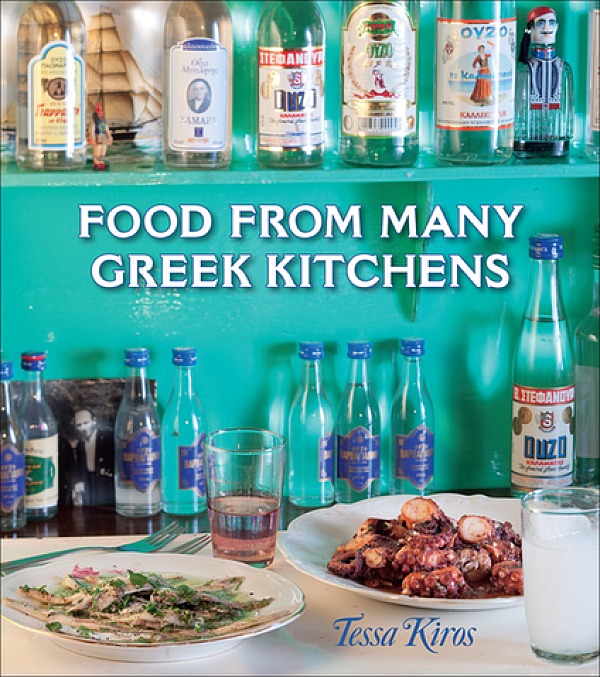


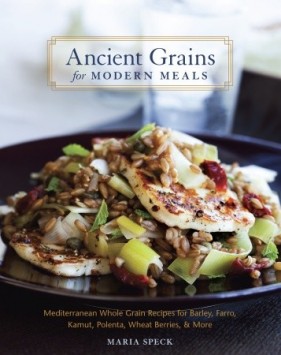
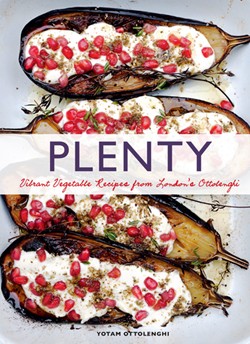
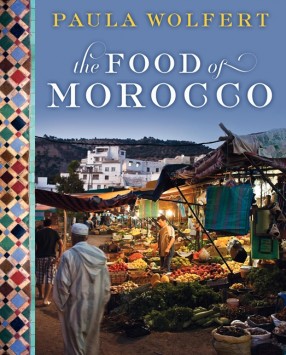
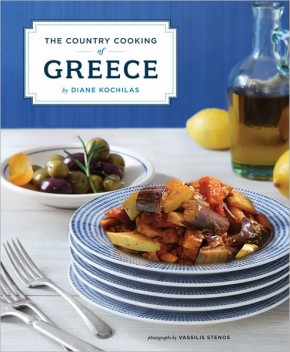
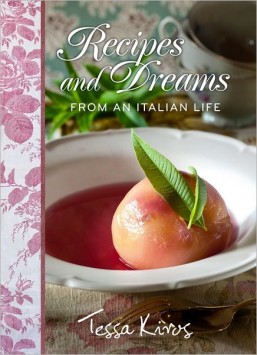
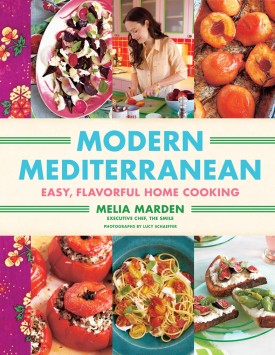
Leave a Reply